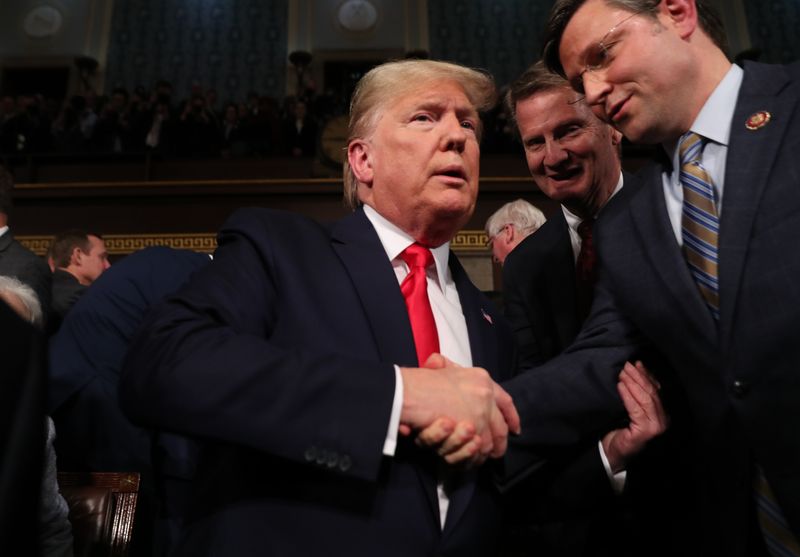By Patricia Zengerle and David Morgan
WASHINGTON (Reuters) - An unprecedented series of foreign officials, including from Japan, Britain and Italy, have visited Washington over the past several months and appealed to congressional Republicans to approve more military aid for Ukraine.
But those lawmakers may listen to a different voice entirely - former president, and current Republican presidential candidate, Donald Trump.
Japanese Prime Minister Fumio Kishida used an address to a joint meeting of Congress on Thursday to urge lawmakers to overcome "self-doubt" about the country's role on the world stage, warning that Ukraine's hopes "would collapse" without U.S. support.
He spoke on a dais in the House of Representatives chamber with Republican House Speaker Mike Johnson, a close Trump ally who for months has declined to allow a House vote on legislation already passed by the Democratic-led Senate providing $60 billion in aid for Ukraine.
Johnson is due to meet with Trump in Florida on Friday, fueling speculation about whether he will clear a vote on Biden's national security spending request as soon as next week.
Trump, who has frequently complimented Russian President Vladimir Putin, has been critical of Washington's support for Ukraine in its war with Russia and has said he could end the conflict in 24 hours if elected, though he has offered few details.
Ukraine's President Volodymyr Zelenskiy urged his country's allies to make good on their promises of military aid on Thursday, particularly in the form of desperately needed air defense systems as Russia scales up its air strikes.
Moscow has recently renewed its campaign of targeting Ukraine's now crippled energy infrastructure, but as Kiev runs short of Western-supplied munitions, including air defenses, it increasingly struggles to fend off the attacks.
Friday's meeting could allow Johnson to make the case to Trump that he would be better off with a strong Ukraine if he returns to the White House, said Republican Representative French Hill, who backs Ukraine aid.
“I would urge him to make that case,” Hill said.
Support from the party's presidential nominee could also bolster Johnson as he faces a threat from firebrand Republican Representative Marjorie Taylor Greene, a staunch Trump ally and passionate Ukraine aid opponent, to seek Johnson's ouster as speaker if the spending bill passes.
Greene said after Kishida's speech that she was sure Trump and Johnson would discuss the aid package, but did not offer an opinion. "I think that President Trump can present his views, and I don't speak for the president," she said.
The national security spending bill, which also includes billions in assistance for Israel and Taiwan, passed the Democratic-led Senate with 70% support in February.
"If we want to protect against the Chinese Communist Party endangering Taiwan, the House should quit stalling and pass the supplemental. If we want to prevent handing Putin a victory in Europe, the House should do the right thing for democracy and pass the Senate's aid package now," Democratic Senate Majority Leader Chuck Schumer said after Kishida's speech.
Congress has approved $113 billion for Ukraine since Russian troops launched a full-scale invasion in February 2022. But it has not passed any of Democratic President Joe Biden's requests for emergency assistance for Kyiv since December 2022, before Republicans took control of the House.
Johnson voted repeatedly against Ukraine aid before he became speaker.
ADVICE FROM ABROAD
Officials from several other countries have also come to Washington this year, arguing for Ukraine assistance. Italian Prime Minister Giorgia Meloni visited in March and German Chancellor Olaf Scholz came in February.
This week, British Foreign Minister David Cameron met Trump in Florida and then came to Washington. Cameron did not meet with Johnson this trip, although the two met in December.
The visits are unusual - foreign leaders generally work to avoid the appearance of influencing U.S. legislation. But analysts said this push reflects deep anxiety, especially in Europe, about how long Ukraine can hold on without significant new help from Washington.
"Europe is feeling very nervous about the United States and our commitment to NATO, Ukraine and Europe in general," said Elizabeth Hoffman, director of congressional and government affairs at the Center for Strategic and International Studies.
Some lawmakers welcome the attention.
"As I talk to people around the world... they really look to the United States, not only for leadership but for their own comfort about the fact that we are an anchor and we're the moral compass... of the planet, and it's appreciated," said Senator Jim Risch, the top Senate Foreign Relations Committee Republican.
There has been skepticism, too, as there was when Zelenskiy came to Capitol Hill for a second time in December, a year after addressing a joint meeting of Congress.
Johnson did not schedule time for Zelenskiy to address the House. And after meeting with the Ukrainian leader, he accused Biden's administration of asking for billions of additional dollars without appropriate oversight or a clear strategy for victory.

Representative Bob Good, chairman of the House Freedom Caucus, said he respected Trump's prerogative to weigh in on anything he wants, and to try to influence Johnson or Republicans in Congress.
"All Republicans care what President Trump thinks," Good told Reuters. "We respect President Trump as a leader of our party, we respect him as the anticipated next president, we hope. So he has a lot of influence."